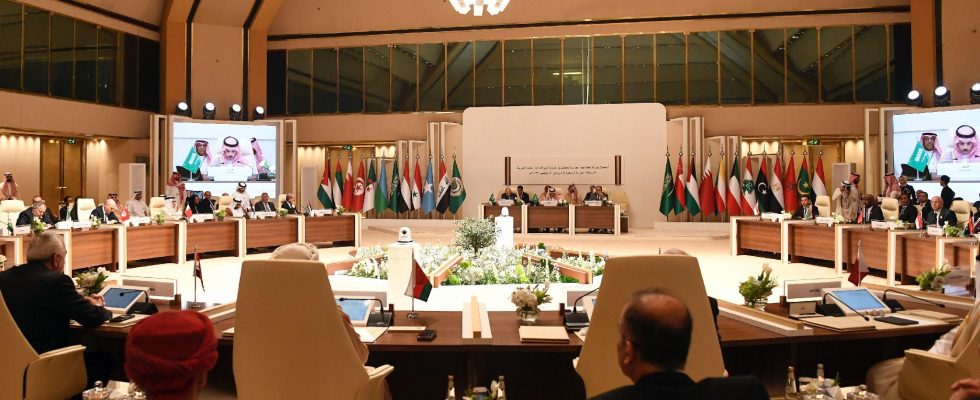Iranian President Ebrahim Raïssi arrived this Saturday, November 11 in Saudi Arabia to participate in an Arab-Islamic summit on the war between Israel and Palestinian Hamas in the Gaza Strip, according to images from the state television channel. Saudi Al-Ekhbariya. Saudi Arabia holds emergency summit of Arab League and Organization of Islamic Cooperation (OIC) in Riyadh, during which Arab leaders and Iranian president are expected to call on Israel to end its offensive in Gaza before the conflict engulfed the region.
Wearing the traditional Palestinian keffiyeh as he got off the plane, Ebrahim Raïssi was welcomed by Saudi officials at the airport, for his first visit to the kingdom since the announcement in March of the restoration of relations between the two countries.
“Common position of Arab-Muslim countries”
The Arab League and the OIC were initially scheduled to hold their meetings separately, but the Saudi Foreign Ministry announced early Saturday that the two organizations’ summits would be held jointly. This decision highlights the need to reach “a unified collective position that expresses the common Arab and Muslim will regarding the dangerous and unprecedented events observed in Gaza and the Palestinian territories”, declared the Saudi Press Agency.
The Arab League will discuss “the way forward on the international stage to end the aggression, support Palestine and its people, condemn the Israeli occupation and hold it accountable for its crimes”, its deputy secretary general said on Thursday, Hossam Zaki.
“We don’t expect anything,” says Islamic Jihad
Islamic Jihad, Hamas’ ally in Gaza, said, however, that it expected “nothing” from this meeting. “We do not place our hopes in such meetings” which have never produced results, Mohammad al-Hindi, deputy secretary general of the group, said Friday at a press conference in Beirut. “The fact that this conference is being held after 35 days (of war)” is a clear indication, he added.
Israel and its main ally, the United States, have so far rejected demands for a ceasefire, a stance that is expected to draw sharp criticism at meetings this Saturday. Saudi analyst Aziz Alghashian says fingers should not only be pointed at Israel, but also those who “make it easier for it” […] that is to say essentially the United States and the West.
The differences in position were clearly displayed during the latest visit of US Secretary of State Antony Blinken to the region, and that of British Foreign Secretary James Cleverly on Thursday in Riyadh, where he met some of his counterparts Arabs. “What we have said is that it is understandable to call for a ceasefire, but we also recognize that Israel is taking steps to ensure its own stability and security,” James Cleverly said.
Avoid regional conflagration
Iran supports Palestinian Hamas but also Lebanese Hezbollah and Yemen’s Houthi rebels, who raise fears of an extension of the conflict. Exchanges of fire between Israel and Hezbollah are daily on the Israeli-Lebanese border, while Yemeni rebels have claimed several drone and missile attacks against southern Israel.
The Saudi monarchy, which maintains close ties with the United States and which considered normalizing its relations with Israel before the war, fears being targeted, analysts cited by AFP believe. On Friday, the kingdom’s crown prince and de facto ruler, Mohammed bin Salman, denounced “continued violations of international humanitarian law by Israeli occupying forces” in his first public statement on the war.
“The Saudis hope that the fact of not having yet normalized their relations and having a channel (of communication) with the Iranians gives them some protection,” said Kim Ghattas, author of a book on the Iranian rivalry -Saudi, during a round table organized by the Arab Gulf States Institute in Washington. “And I think the Iranians hope that the fact that they are in contact with the Saudis […] also offers them some protection,” she added.
Fights around hospitals
This emergency summit is being held in a context of intensifying fighting around hospitals in Gaza, particularly that of al-Shifa, the largest in the territory, between Israeli troops and Hamas fighters. The NGO Doctors Without Borders (MSF) spoke this Saturday morning of a “catastrophic” situation inside the establishment.
“All hospitals in Gaza City were targeted” on Friday by the Israeli army, assured the director of al-Shifa hospital, Mohammed Abou Salmiya. Before the UN Security Council, the head of the World Health Organization (WHO), Tedros Adhanom Ghebreyesus, renewed his calls for a ceasefire, stressing that the health system of the strip Gaza is “on its knees.”
The Israeli army did not comment on these assertions, but assured Friday that it would “kill” Hamas fighters “who fire from hospitals” in Gaza. She said in the evening that she had eliminated “around 150 terrorists”. In total, 20 of the territory’s 36 hospitals are no longer operational, according to the UN agency responsible for humanitarian coordination (Ocha), even as the number of injured increases daily.
French President Emmanuel Macron, for his part, “urged Israel to stop” the bombings killing civilians, in an interview with the BBC. “These babies, these women, these elderly people are being bombed and killed.” There is “no justification” and “no legitimacy for this,” he said.
Shelled relentlessly for more than a month and subjected to a total siege, the small Palestinian territory where 1.6 of the 2.4 million inhabitants have been displaced, according to the UN, is plunged into a catastrophic humanitarian situation. Israel agreed to make daily humanitarian “breaks” to allow civilians to flee to the more spared south of the territory via a “corridor”.
